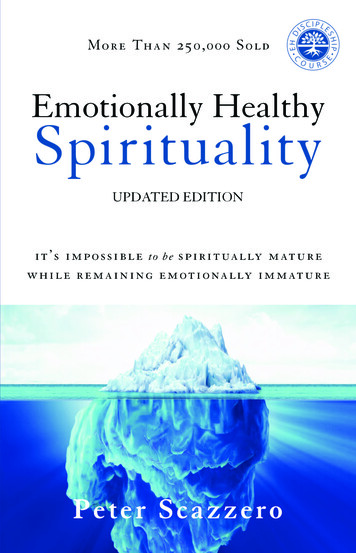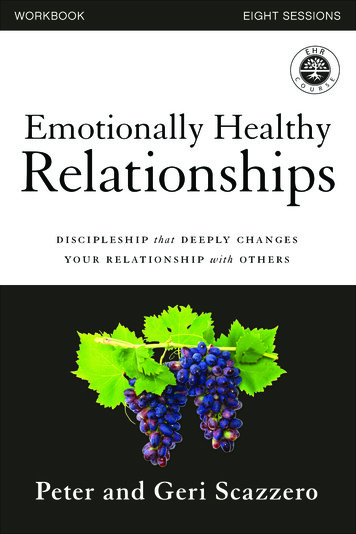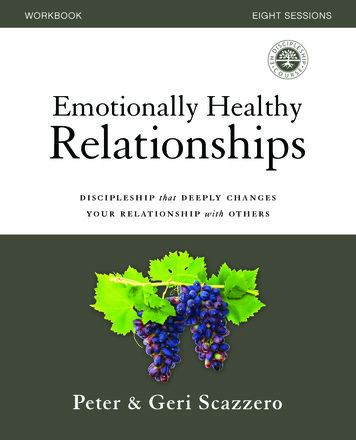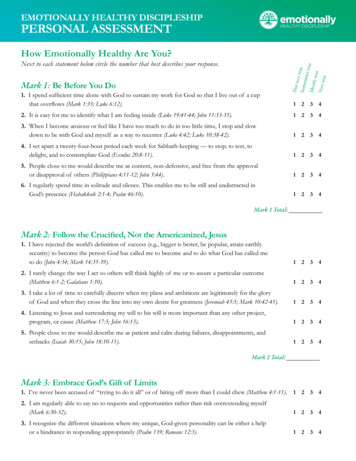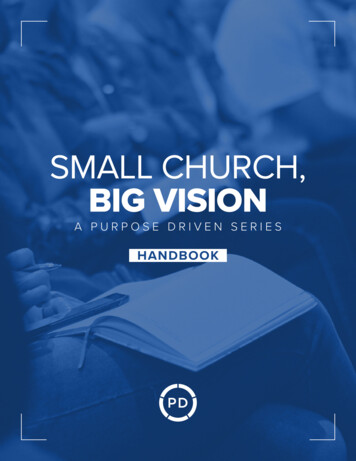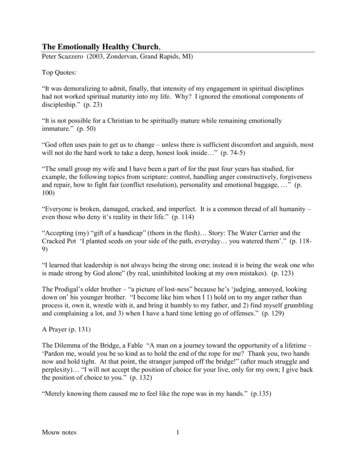
Transcription
The Emotionally Healthy Church,Peter Scazzero (2003, Zondervan, Grand Rapids, MI)Top Quotes:“It was demoralizing to admit, finally, that intensity of my engagement in spiritual disciplineshad not worked spiritual maturity into my life. Why? I ignored the emotional components ofdiscipleship.” (p. 23)“It is not possible for a Christian to be spiritually mature while remaining emotionallyimmature.” (p. 50)“God often uses pain to get us to change – unless there is sufficient discomfort and anguish, mostwill not do the hard work to take a deep, honest look inside ” (p. 74-5)“The small group my wife and I have been a part of for the past four years has studied, forexample, the following topics from scripture: control, handling anger constructively, forgivenessand repair, how to fight fair (conflict resolution), personality and emotional baggage, ” (p.100)“Everyone is broken, damaged, cracked, and imperfect. It is a common thread of all humanity –even those who deny it’s reality in their life.” (p. 114)“Accepting (my) “gift of a handicap” (thorn in the flesh) Story: The Water Carrier and theCracked Pot ‘I planted seeds on your side of the path, everyday you watered them’.” (p. 1189)“I learned that leadership is not always being the strong one; instead it is being the weak one whois made strong by God alone” (by real, uninhibited looking at my own mistakes). (p. 123)The Prodigal’s older brother – “a picture of lost-ness” because he’s ‘judging, annoyed, lookingdown on’ his younger brother. “I become like him when I 1) hold on to my anger rather thanprocess it, own it, wrestle with it, and bring it humbly to my father, and 2) find myself grumblingand complaining a lot, and 3) when I have a hard time letting go of offenses.” (p. 129)A Prayer (p. 131)The Dilemma of the Bridge, a Fable “A man on a journey toward the opportunity of a lifetime –‘Pardon me, would you be so kind as to hold the end of the rope for me? Thank you, two handsnow and hold tight. At that point, the stranger jumped off the bridge!” (after much struggle andperplexity) “I will not accept the position of choice for your live, only for my own; I give backthe position of choice to you.” (p. 132)“Merely knowing them caused me to feel like the rope was in my hands.” (p.135)Mouw notes1
“Understanding and respecting boundaries and limits is one of the most important characterqualities and skill leaders need to be long-term lovers of God and people.” (p. 136)“The essence of the (wilderness) temptation was to transgress or cross over the limits God hadplaced around him. This continues to be a central spiritual warfare issue for most of us who areactively seeking to do God’s work in our lives. Jesus had to learn obedience through what hesuffered (Heb. 5:8). That included setting limits and watching needs that remained unmet. (p.139)“Maturity in life is when someone is living joyfully within their God-given limits.” (p. 144)“Self-care is good stewardship of the gift I was put on earth to offer to others.” Parker Palmer(p.145)Invasive people “who take up too much space at the expense of others.” (p. 146 agenda quote)“(Catastrophic loss) will transform or destroy us, but it will never leave us the same.” GeraldSittser, A Grace Disguised: How the Soul Grows through Loss (p.153)Impact Idea: (What was the most significant concept or idea in the book for you?)“It is not possible for a Christian to be spiritually mature while remaining emotionallyimmature.” (p. 50)“Making incarnation the top priority in order to love others well is both the climax and the pointof this book.” (p. 18)Best quote: “It was demoralizing to admit, finally, that the intensity of my engatement in spiritiualdisciplines had not worked spiritual mature into my life. Why? I had ignored theemotional components of disciplehsip in my life.” (p. 23) Fable: The Dilemma of the Bridge: “I will not accept the position of choice for your life,only for my own; I give back the postiion of choice to you.” (p. 135) Self-care is good stewardship of the gift I was put on earth to offer others. Settinglimits and boundaries for ‘invasive people’ who take too much space at the expenseof others is essential.” (p. 145)The “heresy:” (the concept or idea I disagree with, can’t buy into, or may be truly wrong)With or without principle #2 (break the power of the past), principles 1, and 3-6 are equallyvalid. They are not dependent upon a dysfunctional or troubled ‘family or origin.’ There’s plentyof pain, loss, grief, and desperation conflict, lineliness, weakness and brokenness, to warrantthe wisdom of those other principles.Application for local churches:I affirm the assertion of chapter 1, As Go the Leaders, So Goes the Church. We must be ableto IDENTIFY, not IGNORE, the emotional components of disciplesyip.Application for district ministry:Mouw notes2
Beginning with myself, “leaving former things behind” and finding emjoyment and security inthe Love of God (alone); choosing not to be offended; choosing to turn potential wounds intoopportunities to love even the one wh’s wounding me or us; chosing to “go low” and be aslave not claiming my ‘rights.’ [I am unable to do this alone. I need others in-community,speaking truth-in-love, to do so.]The Principles1. Look beneath the surface.2. Break the power of the past3. Live in brokenness and vulnerability4. Receive the gift of limits5. Embrace grieving and loss6. Make incarnation my model for loving well.Emotionally Healthy Spirituality,Peter Scazzero (Thomas Nelson, 2006)Top Ten Symptoms of Emotionally Unhealthy Spirituality1. Using God to run from God. 2. Ignoring the emotions of anger, sadness, and fear. 3. Dying tothe wrong things.4. Denying the past’s impact on the present. 5. Dividing our lives into “secular” and sacredcompartments. 6. Doing for God instead of being with God. 7. Spiritualizing away conflict. 8.Covering our brokenness, weakness, and failure. 9. Living without limits. 10. Judging otherpeople’s spiritual journey.Becoming (my) authentic selfGod created human beings to feel a wide range of emotions. Researchers have grouped feelingsinto eight main families, with hundreds of variations, blends and nuances: anger, sadness, fear,enjoyment, love, surprise, disgust, and shame. God “feels” (Gen. 1:25, 31; 6:6; 20:5; Is. 42:14;Jer. 30:24; 31:3; Hos. 11:8; Mt. 26:37-38; Mk. 3:5; Lk. 10:21, for example).“Ignatius of Loyola, founder of the Jesuits, explored the difference between consolations (thoseinterior movements and feelings that bring life, joy, peace, and the fruit of the Spirit) anddesolations (that which brings us “death,” inner turmoil, disquiet, and / or “spiritualturbulence”) do not believe every spirit, but test the spirits to see whether they are from God (1Jn 4:1). Sometimes they are our fleshly desires or the enemy. Other times God is prodding us toa better choice. God intends that we mature in learning to recognize how he speaks and guidesus through our feelings.” (p. 73)We experience several great temptations toward a false self: I am what I do (performance), I amwhat I have (possessions), I am what others think (popularity). Differentiation involves theability to hold on to who I am and who I am not living faithful to (my) true self. On the lowerend of the scale are those who need continual validation from others, and under stress they havelittle ability to distinguish between their feelings and their thought process (see Bowen’s scale, p.83-84). We develop our authentic self by paying attention to our interior silence andMouw notes3
solitude, finding trusted companions, moving out of our comfort zone, and praying forcourage (to change and grow).Breaking the power of the pastWe underestimate the deep, unconscious imprint our families of origin leave on us, as blessingsand sins, that are often contrary to Christ’s script for us. The Beaver System Model is onehelpful, well-known way of looking at and understanding our families. Based primarily on howfamilies understand boundaries, they’re able to classify themselves along five different levels ofhealth: the family in pain, the borderline family, the rule-bound family, the adequate family andthe optimal family (see the Beaver System Model, p. 110-111).Joseph is sited as someone who had a profound sense of the bigness of God, admitted honestlythe sadness and losses of his family, rewrote the script according to Scripture, and partnered withGod to be a blessing.“Going back in order to go forward is something we must do in the context of community – withmature friends, a mentor, spiritual director, counselor, or therapist. We need trusted people inour lives of whom we can ask, ‘How do you experience me?’ ‘Tell me the feelings and thoughtsyou have when you are with me.’ ‘Please be honest with me.’ Prayerfully listening to theanswers to these questions will go a long way toward healing and getting a perspective on areasof our lives that need to be addressed.” (p. 114)Letting go of power and control; the Christian life as a journey, through the WallJourneys involve movement, action, stops and starts, detours, delays, and trips into the unknown.Many whom we encounter in ministry are stuck or dropped out altogether, failing to see thetransforming work that God seeks to do in them at their “wall.” Throughout church history greatmen and women have written about the phases of our life journey, such as Augustine, Teresa ofAvila, Ignatius of Loyola, Evelyn Underhill, and John Wesley. In The Critical Journey: Stagesin the Life of Faith, Janet Hagberg and Robert Guelich share a model, including the essentialplace of the Wall in the seasons of our journey.Stage 1: Life-Changing Awareness of God – aware of Christ’s reality, recognize our need formercyStage 2: Discipleship – learning about God and what it is to be a follower of Christ, incommunityStage 3: Active Life – getting involved, serving God and His people, using our gifts and talentsStage 4: The Wall and the Journey Inward – God brings us to the Wall, it compels us inwardStage 5: The Journey Outward – servant-leadership out of God’s deep, accepting loveStage 6: Transformed by Love – surrender and obedience to God’s perfect willFor most of us the Wall appears through a crisis that turns our world upside down. On a certainlevel it is correct to say that Walls come to us in various ways throughout our lifetime. It appearsto be something we return to as a part of our ongoing relationship with God. Withoutunderstanding of the Walls in our journey, however, countless sincere followers of Christ getstuck there, at what St. John of the Cross called Dark Nights of the Soul. Characteristics of adark night include helplessness, weariness, a sense of failure, defeat, barrenness, emptiness,Mouw notes4
dryness, and our feelings of God’s presence evaporate. St. John of the cross listed seven deadlyspiritual imperfections that the dark nights are intended by God to purify us of: pride, avarice(greed), luxury, wrath, spiritual gluttony, spiritual envy, and sloth (see p. 123 for definitions).How long is a dark night likely to last? “It may be months. More probably, it may be a year ortwo or more. Ultimately God chooses the length and level of intensity. He has a uniquepurpose for each of us, knowing how much there is to cleanse out of our inner being, and howmuch he wants to infuse of himself into us for his greater, long-term purposes. Our Fatherknows how much we can handle.” Characteristics of live on the other side include a greater levelof brokenness, a greater appreciation for holy unknowing mystery, a deeper ability to wait onGod, and a greater detachment (to activities, behaviors, habits, things, and people) and greaterattachment to God.Surrender to (my) limitsBiblical grieving, such as in the story of Job, is God’s path to new beginnings. JonathonEdwards contended that Job’s experience is our experience, over a lifetime. In order tofollow Jobs brilliant example, we must pay attention to God and ourselves as we enter into ourdark nights of the soul and treat our emotions as an issue of discipleship.* We must also wait onGod in the confusing, in-between times, resisting the quick solutions and tendencies of ourwestern (and church) culture. We must embrace the gift of limits, evicting selfish demands andexpectations from the center of our being. We are encouraged to climb the ladder of humility(see St. Benedict’s Ladder of Humility, p. 150).Stopping to breathe the air of humility - We are admonished to exercise the spiritual disciplinesof a Daily Office (stopping, centering, silence, and Scripture) and Sabbath keeping (stop, rest,delight in, and contemplate).Learning new skills to love well – practicing the presence of people with emotional maturity andtrue peacemakingLoving Christ above all else – a “trellis” (rule of life) that helps us abide in Christ and becomemore spiritually fruitful. This can include multiple spiritual disciplines, such as prayer,Scripture, silence and solitude, Daily Office, study, Sabbath rest, simplicity, play & recreation,service, mission, care for our physical body, emotional health, family, and friends for the journey(in community).DefinitionsEmotional health: Expressing and managing our feelings, compassion for others, meaningfulrelationships, breaking self-destructive patterns, respecting others without having to changethem, asking for our needs, wants, and preferences, capacity to resolve conflict maturely andnegotiate solutions that consider the interests of others, appropriate sexuality and grieving well live truth and acknowledge brokenness.Contemplative spirituality: Surrender to God’s love, practice His presence, communing with andbeing indwelt by His Spirit, practicing silence, solitude and unceasing prayer, a journey oftransformation toward union with God, aware of the sacred, living in committed community,loving Christ above all else, slowing down, anchoring in God’s love, breaking away fromMouw notes5
illusions, breaking free of false self, smashing idols, and eternal perspectives (in short, practicingspiritual disciplines)*Treating our emotions as an issue of discipleship what are some of the implications of doingso?TDM/messages 10-09 revI QUIT! Stop Pretending Everything is Fine and Change Your Life Geri Scazzero (2010). Grand Rapids: Zondervan.When You Can’t Take It Anymore:“I failed to grasp the truth that a healthy spiritual life includes a carefree balance between servingother people’s needs and desires and valuing my own desires.” (p. 19)“I put most of my efforts into caring for others at the expense of my own soul.”“The accumulated pain and resentment of this imbalance led to my first big ‘quit’ I came torealize that excessive self-denial had led me to a joyless, guilt-ridden existence.” (p. 19-20)Dying to live – “Quitting is about dying to things that are not of God. Biblical quitting is God’spath for new things to come forth in our lives, for resurrection.”Internal voices alarm us with fears of quitting: What will people think? I’m being selfish and not Christ-like. I will mess everything up People will get hurt Everything will fall apart around me. I will jeopardize my marriage.Everything inside us resists the pain associated with dying – the non-negotiable prerequisite forresurrection. As a result, we often cave in to our fears as a short-term anxiety relief strategy.Sadly, this usually leads to painful, long-term consequences, ongoing inner turmoil, joylessness,and festering resentments. (p. 21)Quitting has purified my heart. It has demanded I admit truths about myself that I preferred tobury and avoid. Galatians 5:22-23 “But what happens when we live God's way? He brings giftsinto our lives, much the same way that fruit appears in an orchard—things like affection forothers, exuberance about life, serenity. We develop a willingness to stick with things, a sense ofcompassion in the heart, and a conviction that a basic holiness permeates things and people. Wefind ourselves involved in loyal commitments, not needing to force our way in life, able tomarshal and direct our energies wisely.” (The Message)Quitting has taught me to be loyal to the right things 1. Quit Being Afraid of What Others Will Think: For years I memorized bible studies andmediated on the righteousness of Christ as the foundation of who I am. Nonetheless,LARGE PORTIONS OF MY IDENDITY REMAINED UNTOUCHED BY THE TRUTHOF GOD’S LOVE FOR ME. (p. 29-30)Mouw notes6
We, like biblical heroes wander off track today.Four reasons to stop living for the approval of others:1. You violate your own integrity.2. What or whom you love is at stake.3. The pain of your present situation is so great you (I) have to make a change.4. The fear that things will stay the same is greater than the fear that things will change. Reflect on the movements of your heart – think back on recent interactions withpeople – ask God to help you be aware of temptation to adjust your behavior or wordsfor someone’s approval.Spend time regularly in Scripture, in silence and solitude, receiving the love of God,allowing it to permeate and change every cell in my body.2. Quit Lying“Good Christian” Lying: pretending things are okay when they are not and spinning truth tokeep the peace Trying to ignore feelings of anger, sadness or disappointment (p. 46)Degree of Truth, Degree of Freedom: The degree to which we live in truth is the degree towhich we are free. John 8:31-32 “To the Jews who had believed him, Jesus said, “If youhold to my teaching, you are really my disciples. Then you will know the truth, and the truthwill set you free.” (NIV)When I quit lying, I decided I could no longer participate in the crazy façade I understood asthe Christian community and church. (p. 51)Lying to self – The day I admitted I wasn’t really a very loving person was the day I took ahuge step toward becoming a loving person. A huge burden of pretense fell from myshoulders, and I could finally admit my real weakness and brokenness. I was humbled.Embracing my own flaws was what eventually enabled me to become a safer, softer andmore approachable person. (p. 53) A quote from Virginia Satir, a renowned Family Therapist, “Most of us live inhumanlives because we live inhuman rules about ourselves.” (ex. Don’t show your feelings,always be nice, don’t fight, etc.) Author Sandra Wilson: “The truth sets us free, but it first makes us miserable.”(Books: Released From Shame, Moving Beyond the Pain of the Past) Conflict is normal, important and necessary when close relationships enter into a newcycle of growth and maturity Speaking the truth in love involves choosing the righttiming, using words respectfully, taking responsibility for our own thoughts andfeelings, and speaking in the “I.” We are not born with these skills, they must belearned and practiced. (p. 58-59)o Respectfully: Take the other person’s feeling into account. “I’m puzzledby ”o Honestly: Say what you truly think or feel; don’t “fudge.”Mouw notes7
o Directly: Don’t beat around the bush or drop hints to avoid the truth.o Clearly: Think before speaking in order to describe well what you want to say.Include details.3. Quit Dying to the Wrong ThingsYou die to the wrong things when you set aside or devalue activities that cause your soul tofeel fully alive; when you ignore important relationships; when you care for others to thedetriment of yourself; and when you fail to honestly state your preferences, always deferringto others.“I did not understand the powerful, biblical principle of limits as a gift from the hand ofGod.” (p. 67)(False) beliefs about a “good, loving Christian”1. They never say “no.”2. They have an active social calendar.3. They juggle many things without complaining.4. They get things done.5. They put other’s needs before their own.(Ex. Mistakenly dying to love for outdoors, need for silence and solitude, to extendedfamily, to intentional personal growth, and a great marriage, etc.) (p. 66-69)Discovering Your Self Know your heart: pay attention to the vast array of thoughts and feelings going oninside of you Know your story: look closely at our lives and hold on to that which was good andcourageously admit and change that which was not Know your personality: Who are you? What gives you life? What drains you? Whendo you become self-protective? What tickles your fancy or drives you crazy?Ex. The Enneagram Personality Types: The Perfectionist, The Giver, The Achiever,The Romantic, The Observer, The Dutiful, The Adventurer, The Asserter, ThePeacemaker. (p. 81-87)4. Quit Denying Anger, Sadness and FearForbidden Emotions, Diminished People “How can the world know us, when we don’t trulyknow ourselves or one another.”Emotional IlliteracyAnger: “When I finally quit the lie that good Christians don’t get angry, I walked througha door that changed my life.” Anger is a vital, central discipleship issue for everyChristian. It is a signal with many potential messages from God to us and a warningindicator light on life’s dashboard, inviting us to stop and pay attention to our internalengine. Anger often comes bearing gifts God may help us discover what we reallywant, get us to pay attention to even deeper emotions, help us identify unmetexpectations, and sometimes, see the folly of our sin. (p. 97)Mouw notes8
Anger can be a tool for clarifying values – it helps us know when our personalboundaries are being crossed: Ask, “What is being violated that is important to me?”OR “What am I afraid of?” “Am I hurt? Sad? Disappointed?”Anger can be an indicator of unmet expectations: When you understand you don’thave a right to many of our expectations, because they have not been spoken oragreed upon, you will find you carry much less anger. (p. 99)Anger can be a sin – acknowledging anger so you can process it properly and notproject it onto others is a huge step in spiritual and emotional maturity.Sadness: If emotions can be teachers sent from God, it is perhaps the family of feelingaround sadness – loneliness, hurt, discouragement, depression, gloominess – that are thegreatest teachers of all. “My relationship with sadness was as inhumane and unbiblical as myrelationship with anger. (p. 100-101)God and our losses – loss is a part of life. Over the span of our lives, we will leaveeverything behind. We don’t know how to talk about sadness or disappointments. Yet theBible affirms the human experience and expressions of sadness; it considers grieving lossesas central to our spiritual growth. (p. 102-103)Fear: Facing our fears – of making mistakes, of rejection, of consequences for relaxing, etc.Courage is the capacity to think and act despite our fears.Three Guidelines to Quit Denying Anger, Sadness and Fear: Feel our feelings – Neither neglect them or let them rule out lives. Think through our feelings: Henry Nouwen once remarked that we ought to spend50% of our time living our lives and the other 50% reflecting on what is being lived.“What are the reasons?” Take appropriate action: Sometimes clear in other situations, discerning theappropriate action step takes considerable time gathering info, consulting (a) trustedfriend, extended time alone with God, and learning new skills (p. 113)5. Quit Blaming – Blaming statements can give the illusion of helplessness. We mistakenlybelieve we don’t have choices. Yet blaming undermines the blamer in insidious ways.When blamers play the victim, they often retain a sense of moral superiority over others. Indoing so, they disown responsibility Blamers are typically angry and preoccupied withwhat others “should be doing rather than facing their own discomfort.Take responsibility for your life – Personal Freedom Tool Kit The Fence of Separateness: Practice Boundaries – The word existence comes from aword meaning to “stand apart.” If people cross our boundaries, it is because we allowit. No one but you (me) is responsible to ensure your (my own) boundaries arerespected. (p. 122-124) The Voice of Declaration: Speak up – No one else but you (me) can articulate yourwants and needs or speak your truth when you speak on your own behalf, your notspeaking against others but for yourself. Our daily lives are filled with opportunitiesand challenges to declare ourselves – or to shrink back out of fear or guilt. (p. 124127)Mouw notes9
The Yes/No Medallion: Say yes or no – Many of us feel guilty saying “no.” We wantto be liked and do not want to disappoint people, and perhaps we imagine that sayingno is somehow less than Christ-like. But consider Jesus’ example and whether or nothe disappointed people (to fulfill his mission). (p. 127-129)The Heart of Feelings: Pay attention to feelings – Take regular time to pay attentionto the feelings going on inside of you. The events, people and things that exciteemotion in you are the part of what makes you a unique human being. “When I amaware, for example, of what gives my soul joy and life, I am more apt to assert myselfand pursue those things that bring pleasure and joy.” (p. 129)The Oxygen Mask of Self-Care: Take care of yourself – Think of the emergencyinstructions given pre-flight that he/she that is not breathing cannot help anyone else!We must first take care of ourselves if we want to provide care for others. AuthorParker Palmer asks, “Is the life that I am living the same as the life that God wants meto live?”(Weekly one day Sabbath, one month each summer, 3-4 months every seven yearsduring which we pursue the things that give life.) (p. 130-132)The Mirror of Self-Confrontation: Confront yourself – means humbly acknowledgingour shortcomings and the ways in which we are responsible for our own failures anddisappointments. Pope John Paul II said, “Truth and freedom either go hand and handor together they perish in misery. (p. 132-134)The Key of Hope: Remain hopeful – The golden key of hope unlocks this truth andreleases us from the prison of living in the past focusing too much on the pastprevents is from looking ahead to the future. This frees is to take responsibility for abetter future that, in cooperation with the Holy Spirit we can create for ourselves.Learn how to express difficult emotions, build trust with people, use your voice toassert yourself in an honest and respectful way. (pg 134-136)The Hat of Wisdom: Think carefully – The wisdom of anticipating consequencesrequires careful thinking about short and long-range decisions. Proverbs 14:15 “Thesimple believe anything, but the prudent give thought to their steps.” The right andresponsibility to pause, gather info and then evaluate decisions. (p. 136-138)The Badge of Courage: Be courageous – Enables us to take healthy risks because wedon’t have to prove our worth to earn God’s love. Taking hold of personal freedomrequires courage and faith. There are no guarantees that things will not get harderbefore they get better. You can expect resistance when you begin to challengeunhealthy patterns and shed your false self. You are entering a fiery furnace that willburn out of you all that is inauthentic, illusionary and pretentious. Choosing anauthentic life does not mean choosing an easy life; these decisions are difficult andinvolve pain. The question is whether the pain you choose will be redemptive ordestructive. Redemptive pain demands that you die to the right things so you canmove closer to your destiny. Destructive pain never leads to anything but more pain;it simply recycles the same problems over and over. (See questions on p. 139-140)6. Quit Overfunctioning – When we do for others what they can and should do for themselves. Overfunctioning prevents people, including themselves, from growing up.Overfunctioning dangerously imperils friendships, marriages, churches, workplaces, andfamilies. Overfunctioners shield underfunctioners from the consequences ofMouw notes10
underfunctioning. “Pete was an underfunctioner at home because he was overfunctioning atwork.” (p. 144)Overfunctioning exists on a continuum ranging from mild to severe.Five deadly consequences of overfunctioning: (p. 147) Overfunctioning breeds resentment Overfunctioning perpetuates immaturity Overfunctioning prevents you from focusing on your life’s calling Overfunctioning erodes your spiritual life Overfunctioning destroys communityIf someone dear to us is underfunctioning and I am overfunctioning to maintain therelationship, my actions distort God’s original intention for community. Whenoverfunctioning and underfuntioning are present, relationships are marked instead bydissension, conflict, blaming, helplessness, anger and despair. Author Ed Freidman describesthe negative relational impact of overfunctioning this way: “When one overfunctions inanother’s space it can cause disintegration* of the other’s being.” (*Refers to inhibiting thegrowth and maturity of a person’s God-given sense of self.) Overfunctioners actually believethey know what is best for everyone. In doing so, they invade and limit the development ofothers.As an Overfunctioner, I may not be able to make the underfunctioners moreresponsible, but I can make myself less responsible. Break free!!7. Quit Faulty Thinking – It can mire you in powerlessness, paralyze you in hopelessness, fillyou with false guilt, cut you off from joyful living, obscure your hope for the future, diminishyour capacity for genuine relationships, lock you up in unnecessary pain, and limit your Godgiven potential in Christ.We didn’t know how to respect each-others differences. Not only did we not understandhealthy separation and togetherness, we did not have room for complexity, ambiguity andquestions. The belief that intimate relationships/friendships not only could but should alwaysbe with people in our church. Church provides a lovely context for close relationships butmay not always equal close friendships.Three types of faulty thinking: (from book Hand-Me-Down-Blues by psychologist MichaelaYapko) All-or-Nothing Thinking – Globalizes one aspect of life not goi
Emotionally Healthy Spirituality, Peter Scazzero (Thomas Nelson, 2006) Top Ten Symptoms of Emotionally Unhealthy Spirituality 1. Using God to run from God. 2. Ignoring the emotions of anger, sadness, and fear. 3. Dying to the wrong things. 4. Denying the past's impact on the present. 5. Dividing our lives into "secular" and sacred .


